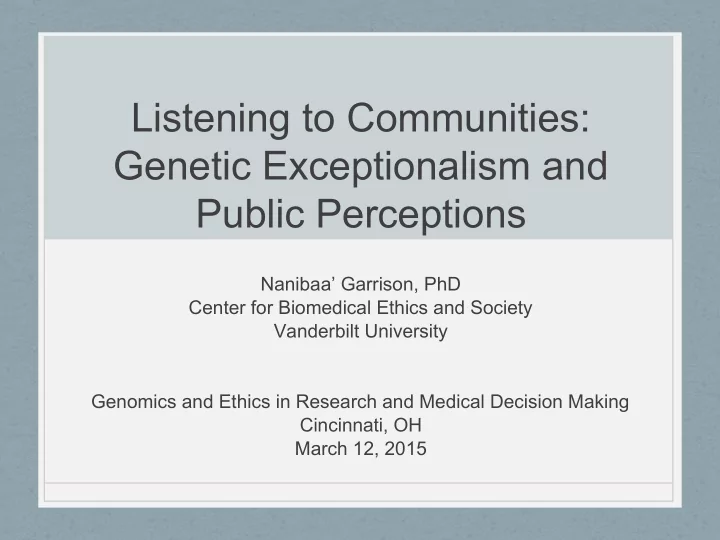

Listening to Communities: Genetic Exceptionalism and Public Perceptions Nanibaa’ Garrison, PhD Center for Biomedical Ethics and Society Vanderbilt University Genomics and Ethics in Research and Medical Decision Making Cincinnati, OH March 12, 2015
Genetic Exeptionalism Claims 1) Genetic information can predict a person’s medical future 2) Genetic test results divulge information about family members 3) Genetic information can be used to discriminate against and stigmatize individuals 4) Genetic testing can cause serious psychological harms Green and Botkin (2003)
Claim 1: Predict one’s medical future • Prenatal and newborn genetic testing • Family histories (including medical) are far more predictive
Claim 2: Impact on families • Sharing genetic results vs. other medical results with family members • Privacy considerations of DNA or other data • Identification of family members based on genetic similarities
Claim 3: Discriminate and Stigmatize • Dissemination of scientific results without community input • “Inbreeding” results from Havasupai tribe • “Alcoholism” results from a tribe in Barrow, Alaska New York Times 2010
Claim 4: Serious psychological harm • “Body fragmentation” as separation of body parts/cells from self • Scientific evidence that contradict origin beliefs New York Times 2010
Shift towards “Distinctiveness” • DNA can be used to make some predictions or identify individuals • Can be used to predict one’s future, and also ancestral past • How distinct is genetic Predictions of what people look like using a DNA analysis tool compared with photos information? of the actual people. Credit The New York Times ; Images and renderings by Mark D. Shriver/Penn State University
Thank you! • Kyle Brothers • Aaron Goldenberg
Recommend
More recommend